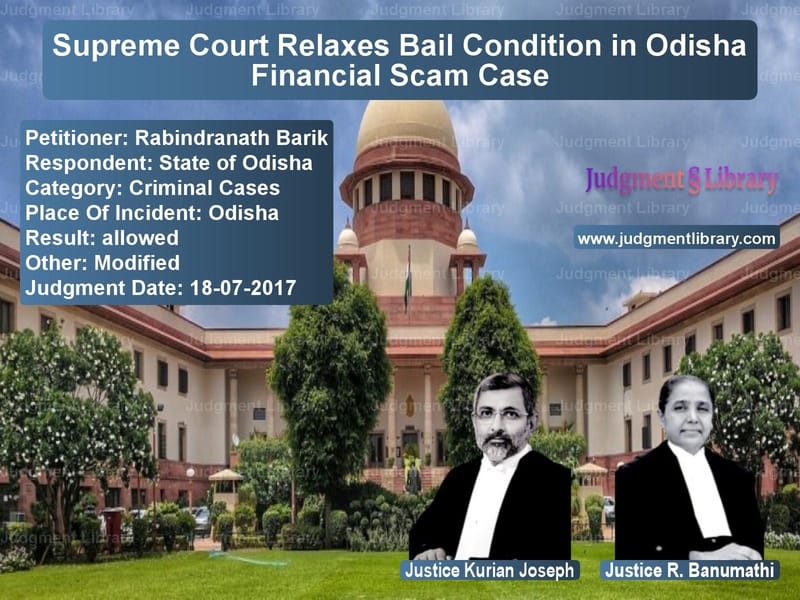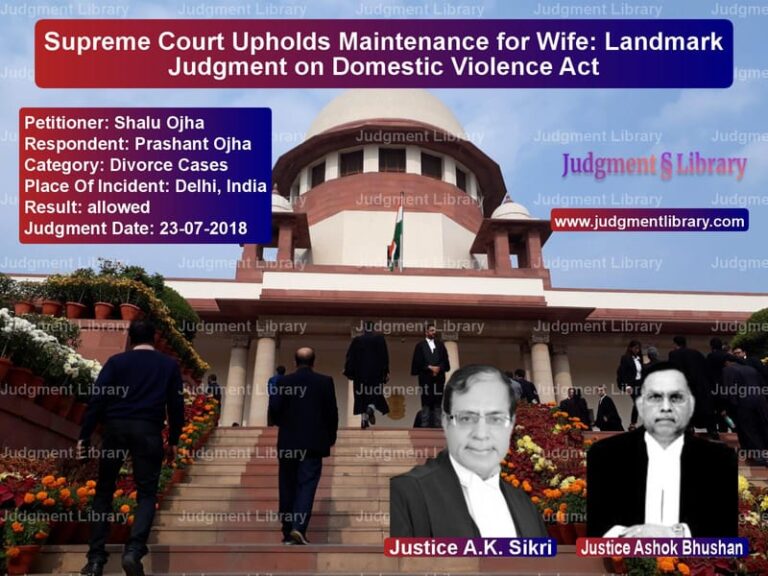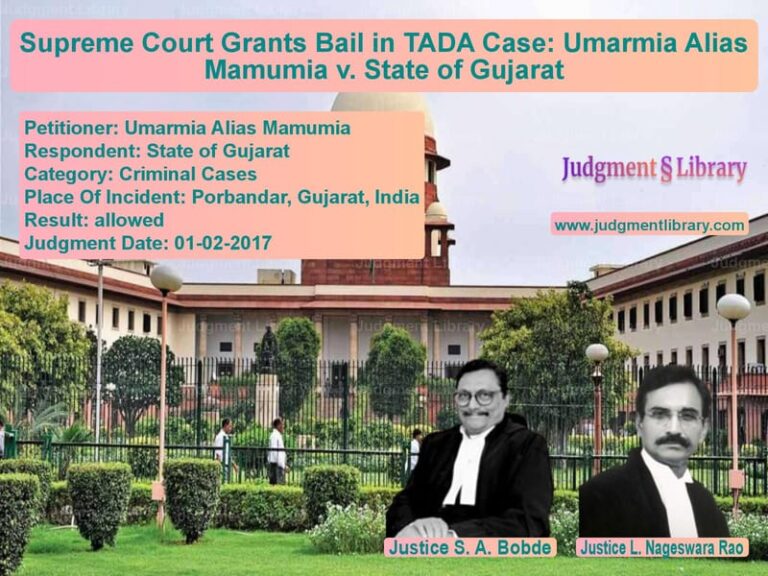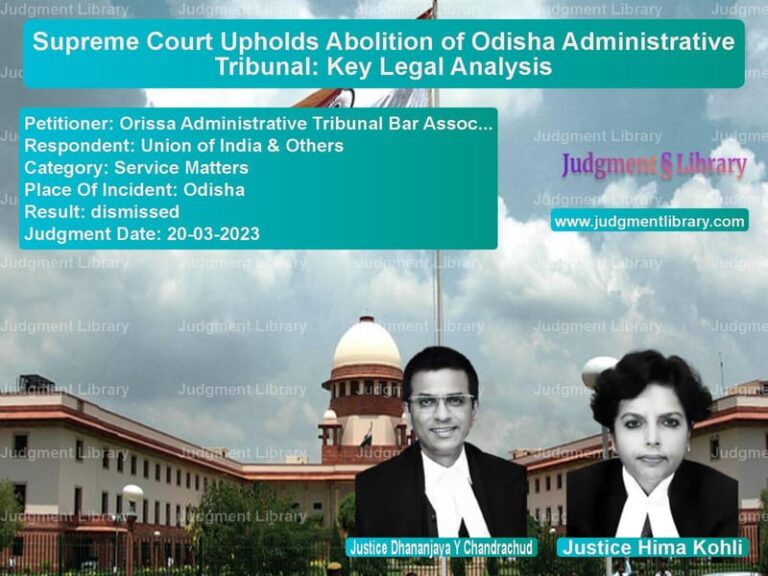Supreme Court Relaxes Bail Condition in Odisha Financial Scam Case
The case of Rabindranath Barik vs. State of Odisha revolves around the appellant’s plea for relaxation of stringent bail conditions imposed by the High Court. The Supreme Court ruled in favor of the appellant, waiving the initially imposed security condition and substituting it with a lower property security requirement.
Background of the Case
The appellant, Rabindranath Barik, was accused in a financial fraud case in Odisha. He was granted bail by the High Court, but the bail conditions included furnishing a security of Rs. 50 lakhs in cash and Rs. 50 lakhs in property. The appellant challenged these conditions, arguing that he lacked the financial resources to comply.
The Supreme Court heard the appeal to determine whether the bail conditions imposed were excessive and whether they should be modified to ensure fair access to justice.
Key Issues Considered
- Whether the High Court’s bail conditions were excessive and unjustified.
- Whether financial incapacity to furnish bail security should prevent an accused from securing release.
- What alternative measures could be adopted to balance judicial fairness and the need to secure the accused’s presence at trial.
Petitioner’s (Appellant’s) Arguments
The appellant contended:
- He did not have personal property to offer as security.
- His co-accused had already furnished security of Rs. 2 crores collectively, and requiring additional security from him was excessive.
- A well-wisher had come forward to offer property security worth Rs. 15 lakhs, which should be considered adequate.
- Stringent financial bail conditions discriminate against economically weaker accused persons.
Respondent’s Arguments (State of Odisha)
The state opposed the appeal, arguing:
- The financial fraud case involved significant sums of money, necessitating strict bail conditions.
- Large bail securities were required to prevent the accused from absconding.
- Reducing the security requirement might set a precedent for relaxing conditions in other serious financial offenses.
Supreme Court’s Analysis and Judgment
The Supreme Court, comprising Justices Kurian Joseph and R. Banumathi, ruled in favor of the appellant. The Court made the following key observations:
1. Bail Conditions Must Be Proportionate
The Court noted that while financial fraud cases require careful scrutiny, bail conditions should not be excessive:
“The condition of bail should not be so stringent that it amounts to denial of bail itself.”
2. Excessive Bail Conditions Violate the Right to Liberty
The Court emphasized that imposing unaffordable bail conditions effectively denies an accused the right to bail and violates the principle of fairness:
“The inability to furnish a high-value security should not be a ground to deny an individual’s liberty.”
3. Precedent in Financial Cases
The Court acknowledged that the co-accused had already provided significant security and ruled that further security from the appellant was unnecessary:
“Considering that other co-accused have already furnished security worth Rs. 2 crores, an additional burden on the appellant is unjustified.”
4. Reduction in Bail Security
The Court substituted the initial bail condition with a reduced security requirement:
- The appellant was required to furnish a property security worth Rs. 15 lakhs instead of Rs. 50 lakhs.
- The property security must be provided within one month.
- The appellant must continue cooperating with the investigation and trial.
Final Orders
- The Supreme Court waived off the initial cash and property security condition.
- The appellant was allowed to furnish property security of Rs. 15 lakhs instead.
- The modified bail conditions must be complied with within one month.
- The appeal was allowed with the modified conditions.
Legal Implications of the Judgment
1. Right to Bail Should Not Be Denied Due to Financial Constraints
The ruling reinforces that financial incapacity should not prevent an accused from obtaining bail.
2. Balanced Approach in Financial Crime Cases
The decision ensures that while securing bail in financial fraud cases remains stringent, it should not be punitive.
3. Fair Treatment for Accused in Criminal Proceedings
The Court emphasized the need for a balanced approach, ensuring fair treatment for all accused persons.
Conclusion
The Supreme Court’s decision in Rabindranath Barik vs. State of Odisha marks an important ruling in bail jurisprudence. The judgment ensures that stringent bail conditions do not unfairly disadvantage economically weaker accused persons. By modifying the security requirements, the Court reinforced the principle that bail conditions should be proportionate and just.
Don’t miss out on the full details! Download the complete judgment in PDF format below and gain valuable insights instantly!
Download Judgment: Rabindranath Barik vs State of Odisha Supreme Court of India Judgment Dated 18-07-2017.pdf
Direct Downlaod Judgment: Direct downlaod this Judgment
See all petitions in Bail and Anticipatory Bail
See all petitions in Fraud and Forgery
See all petitions in Money Laundering Cases
See all petitions in Judgment by Kurian Joseph
See all petitions in Judgment by R. Banumathi
See all petitions in allowed
See all petitions in Modified
See all petitions in supreme court of India judgments July 2017
See all petitions in 2017 judgments
See all posts in Criminal Cases Category
See all allowed petitions in Criminal Cases Category
See all Dismissed petitions in Criminal Cases Category
See all partially allowed petitions in Criminal Cases Category







